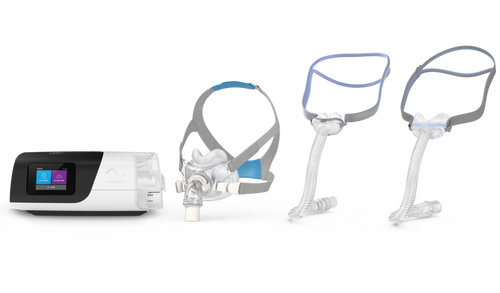
How to Choose the Right CPAP Mask
Share
Different face shapes and sizes call for different mask types. Your breathing habits, comfortability and type of sleep disorder also come into play. For the perfect fit, the best thing to do is to try on the CPAP mask or headgear personally.
There are three main types of CPAP masks: nasal mask, nasal pillow mask and full-face mask. Choosing the right one is crucial for the effectiveness of your CPAP therapy.
Quick Word on CPAP therapy and CPAP machines
CPAP therapy is a common and effective CPAP treatment for obstructive sleep apnea (OSA) and other sleep-related breathing disorders. To perform the therapy, CPAP machines are essential.
The CPAP machine works by generating a steady stream of pressurised air into your airways. Thus, the airways remain open, preventing collapse and pauses in breathing. The delivery of pressurised air is made possible by a hose connected to the mask.
Types of CPAP Masks
Much like choosing the right CPAP machine, finding the right CPAP mask is essential to achieving a good night’s sleep. See which type of sleep apnea mask is the most appropriate for you:
Nasal masks
The CPAP nasal mask is positioned over the nose and efficiently covers the areas starting from your nose’s bridge down to your upper lip. Since it’s not directed to the nasal passage, you’ll experience a more natural airflow.
To keep it secure during sleep therapy, the nasal mask is fitted with suction cups. There are also CPAP nasal masks with a curved nasal cradle cushion. This type of sleep apnea mask is perfect for:
- Patients who need high-pressure settings
- Patients who sleep on their side or stomach
- Nose-breathers
A CPAP nasal mask isn’t advisable for mouth-breathers, unless there’s a chin strap to prevent the jaws from opening. It also has a tendency to irritate your forehead and nose bridge. Furthermore, a nasal mask isn’t recommended for OSA patients with enlarged turbinate, collapsed narrowed nasal valve and deviated septum.
Nasal pillow masks
The nasal pillow mask has a more minimalist design, with a small cushion (nasal pillows) that only covers your nostril area. But unlike nasal CPAP masks, it might feel uncomfortable if you require a higher pressure.
Since they’re lightweight (lightest of all types of mask) and unobtrusive, nasal pillow masks allow more movement. You can even wear glasses comfortably even with one on. A nasal pillow mask is ideal for patients who:
- Constantly change from one sleep position to another
- Like to read or watch TV before bedtime
- Have lots of facial hair that may hinder a good fit
- Might feel claustrophobic with larger masks
Full-face masks
The full-face mask covers your mouth, nose and other parts of your face. In addition, there are full-face CPAP masks with nasal tubes positioned into the nasal passage. The wide area of the mask somehow dissipates the force of air pressure, and thus, it works in sync with high-pressure settings. Apart from this, full-face masks are good for:
- Patients who sleep on their back
- Less active sleepers
- Patients who frequently suffer from nasal congestion
- Mouth-breathers
It should be noted that full-face masks have an increased incidence of air leaks because of their wider surface area. Any air leakage at the mask’s top is most likely to cause dry and irritated eyes. Also, reading and watching TV is fairly impossible to do while using a full face mask.
What If You Use the Wrong Mask Fit?
So, what could possibly happen if you use an ill-fitting CPAP mask? Below are some reasons why you need a sleep specialist to recommend the right sleep apnea mask:
Discomfort
You'll find it difficult to sleep and may not breathe comfortably. These can ultimately lead to non-compliance with the CPAP therapy.
Mask dislodgement
Sleep apnea patients are restless sleepers. An ill-fitting mask may come off as you toss and turn during sleep. Or, you might unintentionally remove it out of sheer discomfort.
Ineffective therapy
One of the common issues associated with ill-fitting masks is leakage. And with a leaky mask, you’re not getting the full air pressure you need, disrupting the therapy.
Dry nose and eyes
A leaky or wrong-fit mask can cause a dry, stuffy nose. The airflow may also direct air into your eyes, causing them to dry, as mentioned earlier.
Skin irritation
If the mask is too tight, you might experience irritation on your skin.
Conclusion
While most CPAP masks are adjustable, there are other factors to consider when choosing the right sleep apnea mask. It shouldn’t just fit perfectly but also comfortably. You should also consider your required air pressure. In this connection, a consultation with a sleep doctor is a must before buying a sleep apnea mask or any CPAP equipment.
If you would like to be assessed and fitted for a mask by our CPAP therapists, call 1300 414 190 to book an appointment today!

